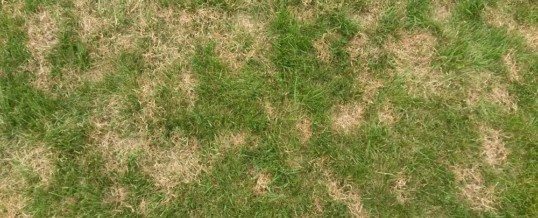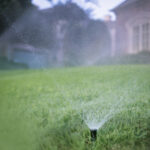How about this weather? It’s hard to complain about these cooler temperatures and rain, but it does bring Brown Patch, which we’ve been seeing a lot of in the past week.
We typically don’t see Brown Patch until later September in North Texas, but with these cooler temperatures at night, we are seeing some brown rings and patches showing up in our customers with St. Augustine lawns.
Brown Patch is a fungus that attacks St. Augustine in the fall (and spring.) The reason we experience so much Brown Patch during these two seasons is because our warm days and cool evenings mean your lawn never fully dries and Brown Patch thrives on these damp conditions.
To understand Brown Patch, you need to consider that St. Augustine is a tropical plant and our North Texas summers of blistering heat (although this year wasn’t as hot) coupled with cold winter days put far more stress on it than its more natural home in places like Houston or Florida.
The stress of summer followed by our fall like conditions of warm days and cool nights create the perfect environment for Brown Patch.
Brown Patch isn’t going to destroy your lawn. Its biggest crime is making your lawn look bad. It typically goes away after our first frost. The bigger risk is that if you let it get out of control it can weaken your grass which could then suffer freeze damage if we have a cold enough winter.
If you want to avoid or treat Brown Patch I recommend watering your lawn in the morning so it has the best chance to dry during the day. You can also cut back your watering in shady areas. Instead of 30 minutes per week, try 10 or 15 minutes in those areas. You can download our free fall watering guide here.
Another thing to note if you are doing your own fertilization is that Brown Patch feeds on nitrogen. You need to avoid high-nitrogen fertilizers in St. Augustine lawns during early spring and late summer through fall. At Village Green we use a 5-10-31 ratio fertilizer.
Finally, if you see signs of Brown Patch you should treat the areas with Propiconazole. This isn’t going to make the Brown Patch go away, but it will stop the spread into other areas of your lawn.
As always, if you have a question regarding your lawn and landscape give us call at 972.495.6990 or email me at [email protected]. I love to answer your questions and often turn them into Quick Tips to help teach our customers on all things lawn and landscape related!



